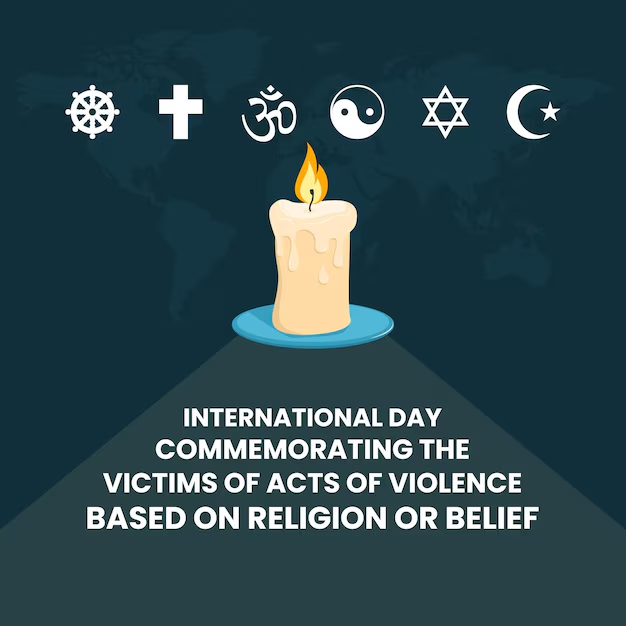Understanding the Epidemic of Religion-Based Violence
The prevalence of religion-based violence is a pressing issue that affects countless individuals and communities worldwide. This form of violence arises from deep-seated hatred, intolerance, or misunderstanding tied to differing beliefs and practices. According to recent reports from organizations such as the Pew Research Center, more than 80% of the global population identifies with a religious group, and unfortunately, within this diverse tapestry, incidents of violence motivated by religious differences have surged alarmingly. Across various regions, statistics reveal a disturbing trend: in places such as Myanmar, India, and parts of Africa, communities face escalating hostility, resulting in tragic loss of lives and displacement.
These incidents are not limited to any single religion; rather, they manifest across the spectrum of faiths. Examples abound, including targeted assaults against minority groups in predominantly religiously homogeneous societies. Each act of violence, whether it be an attack on a place of worship, discrimination against individuals, or state-sanctioned persecution, signifies a broader societal failure to promote dialogue and coexistence. Victims often experience not only physical harm but also deep psychological trauma and social ostracism. Reports from NGOs and human rights organizations illustrate harrowing personal stories, shedding light on how lives are shattered simply due to one’s faith.
Moreover, religion-based violence obfuscates the fundamental principles of peace, tolerance, and respect that underpin multicultural societies. By perpetuating fear and division, these acts threaten the social fabric that allows diverse groups to coexist harmoniously. The consequences extend beyond the immediate victims, rippling through communities and fostering an environment where mistrust and hostility thrive. It is imperative for societies to confront this epidemic and actively seek strategies to promote understanding, encourage dialogue, and safeguard the rights of all individuals, regardless of their beliefs. Only through a concerted effort can we hope to confront, halt, and ultimately eradicate this insidious cycle of violence.
The Role of Societal and Institutional Accountability
The emergence of religion-based violence is often rooted in systemic societal issues, making it imperative for governments, institutions, and communities to uphold accountability. Ensuring that all individuals can practice their beliefs without fear of persecution requires a concerted effort across various levels of governance and society. Implementing and enforcing anti-discrimination legislation is a fundamental responsibility of governing bodies. These laws serve as both a deterrent and a mechanism for redress, enabling victims to seek justice and holding perpetrators accountable for their actions. As such, governments must prioritize the design and enactment of robust frameworks that address hate crimes and discrimination based on religion.
Furthermore, beyond legal measures, educational initiatives serve a pivotal role in combating intolerance. By promoting values of tolerance and inclusion within educational systems, communities can foster a deeper understanding of diverse beliefs from a young age. Schools and universities should adopt curricula that emphasize critical thinking and empathy towards different religious perspectives. This educational outreach can effectively dismantle the stereotypes and prejudices that often fuel violence against certain religious groups.
Another essential facet of societal accountability is the responsibility of leaders to initiate and sustain open dialogue among diverse communities. Leaders, both within religious institutions and government, play a vital role in counteracting divisive narratives that may perpetuate fear and misunderstanding. By creating platforms for constructive conversation, leaders can encourage collaboration and mutual respect among various faith groups. Such efforts can build bridges, reduce tensions, and contribute to a unified response against religion-based violence. In doing so, communities can cultivate an environment of solidarity and resistance against intolerance, ultimately reinforcing the idea that diversity is a strength rather than a source of conflict.
Mobilizing Community Engagement and Digital Responsibility
In an age where digital platforms play a significant role in shaping public discourse, the need for community engagement in combating hate speech has never been more critical. Communities, comprised of diverse individuals and organizations, serve as the frontline defenders against the divisive influences that can lead to violence based on religious differences. Active participation from community leaders, religious institutions, and local organizations can create an inclusive environment that promotes understanding and tolerance among different faiths.
One effective approach to mobilizing community engagement is through educational initiatives that raise awareness about the impact of religion-based violence and the responsibility of every individual to contribute to a respectful dialogue. Workshops, seminars, and community dialogues can unite individuals, helping them understand the significance of empathy and acceptance in countering hatred. Community leaders can take the initiative to incorporate these discussions into local events, fostering an atmosphere where healthy, constructive conversations are encouraged, and hate speech is not tolerated.
Moreover, the role of digital platforms in either facilitating or combating hate speech cannot be understated. Social media companies have a significant responsibility to moderate content that threatens to incite violence or spread divisive rhetoric. Implementing robust policies against hate speech is critical; however, it must be complemented by a commitment to promoting positive, respectful dialogue. This means not only removing harmful content but also endorsing campaigns that advocate for unity and understanding among diverse communities.
By leveraging both community engagement and digital responsibility, society can work towards creating safer, more inclusive environments. It is essential for citizens to come together to challenge hate in all its forms while holding digital platforms accountable for their role in the perpetuation of divisive narratives. The collective action taken at both local and digital levels signifies a powerful stand against religion-based violence.
A United Front: Committing to Celebrate Diversity
The complexity of human experience is enriched by the diverse tapestry of cultures, beliefs, and traditions that exist across the globe. In the face of religion-based violence, it becomes imperative to recognize the collective responsibility we share in fostering an environment that values and protects this diversity. The interplay of various worldviews not only enhances our collective understanding but also contributes to a more harmonious coexistence. Celebrating diversity requires action beyond mere acknowledgment; it calls for a united front where individuals, communities, and nations collaboratively work towards a common goal.
Solidarity is a crucial element in this pursuit. It is essential for individuals to unite regardless of their background and to stand firm against acts that seek to divide based on religious beliefs. Initiatives that promote dialogue, understanding, and respect for different faiths can cultivate a culture where diversity is seen as an asset rather than a challenge. This can be achieved through community-based programs, interfaith dialogues, and educational projects aimed at dismantling prejudices and stereotypes that often fuel violence against religious minorities.
Furthermore, nations must play a pivotal role in shaping policies that reinforce the protection of religious diversity. This can include enacting laws that guard against discrimination and violence, alongside fostering civic spaces where people of various beliefs can engage peacefully. As a global community, we need to encapsulate the essence of unity in our actions, striving for initiatives that reflect inclusive values. By engaging in advocacy, volunteering for interfaith activities, and supporting organizations dedicated to this cause, we can collectively take meaningful steps towards nurturing a world where respect for all beliefs prevails.
Ultimately, the journey towards celebrating diversity is a shared one, necessitating a recommitment to action from every individual. Let us engage actively, ensuring that our world reflects our collective value for peace, mutual respect, and harmony among all faiths.


